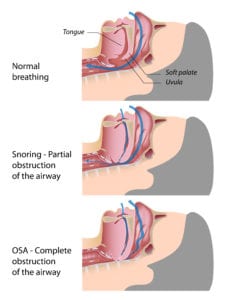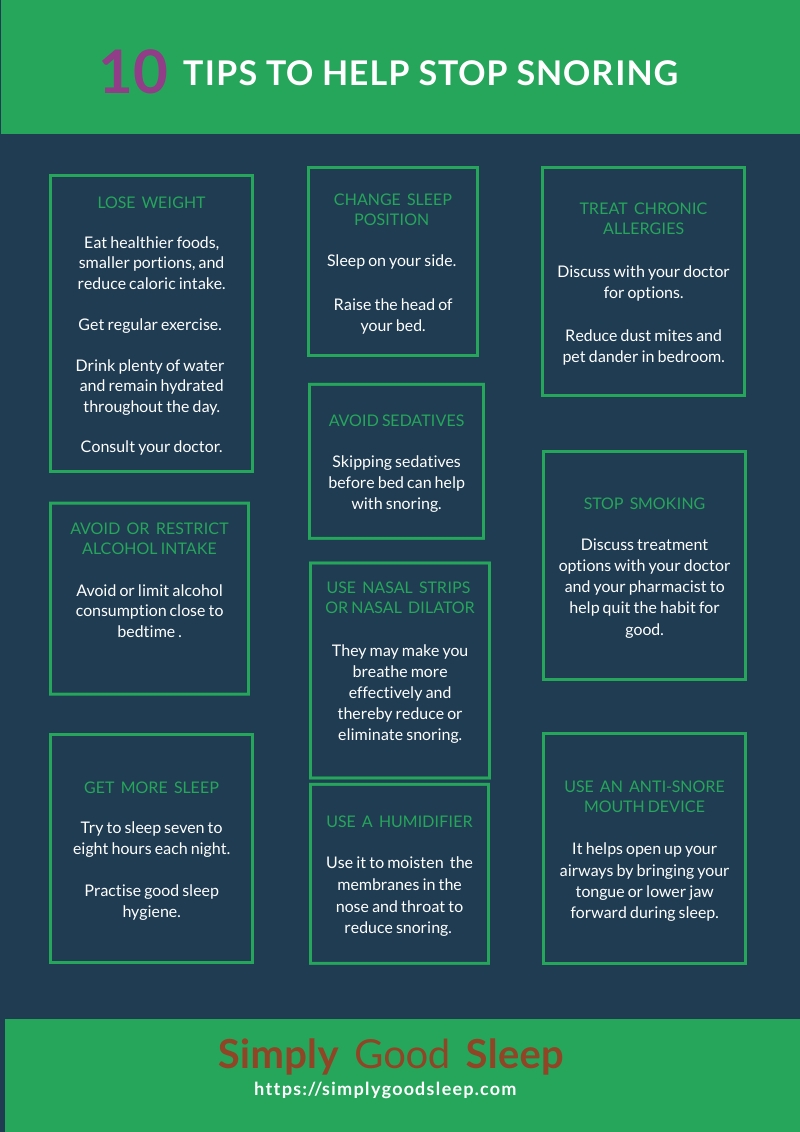
Snoring is one of those problems that end up affecting our life and also the lives of people around us. This is noisy breathing during sleep and it’s rather common for people of all ages and for both genders. Around 90 million people snore in the US and similar high numbers can be found all over the globe. Do you snore? Snoring can prevent you, and your partner, from getting a good night’s sleep. Learn why people snore and what you can do about it.
This post contains affiliate links. If you make a purchase through our links, we may earn a small commission through no cost to you. Details here.
What is Snoring?
During sleep, snoring results when air is unable to move freely through your nose and throat, causing the surrounding tissues to vibrate. People who snore may have excessive nasal and throat tissue or simply, tissue that vibrates easily. Your tongue can also get in the way of smooth breathing, thereby causing snoring.

Ongoing frequent snoring at night can affect the quality of your sleep. Chronic sleep deprivation may result in decreased daytime alertness, and increased risk for health conditions.
Your snoring can create relationship frictions with your partner, especially if your snoring is keeping him/her awake at night.
There are many strategies you can try to help both you and your partner sleep better at night.
Causes of snoring may differ from one snorer to another. Once you understand why you snore, you can find the right solutions to stop snoring for simply good sleep – for you (and your partner).
Click on the ZQuiet banner to learn more
What causes snoring?
Lifestyle and health factors can cause snoring. Some common causes of snoring include:
Aging
Your throat narrows, and your throat muscle becomes less toned. Lifestyle changes, good sleep hygiene, and exercise can help to prevent snoring.
Being overweight
Carrying fatty tissue just around your neck or throat and poor muscle tone can cause snoring.
Ongoing Lack of Good Sleep
Being chronically sleep deprived may cause further relaxation of your throat.
Sleep posture
Changing your sleep position to other than sleeping on your back can help stop snoring. Sleeping supine can cause your throat tissues to relax and block the airway.
Gender
Men are more likely to snore than women.
Genetics
Certain causes of snoring may be hereditary, such as a narrow throat, large adenoids or tonsils, long soft palate, and deviated nasal septum.
Smoking, alcohol, and medications
Smoking, alcohol intake, and certain medications, such as sedatives, can relax muscles and contribute to snoring.
Nasal and sinus problems
Blocked airways can make it difficult to breathe in, leading to snoring.
Ten tips to help stop snoring
Now that you know what causes snoring, let’s look at what you can do about it.
People who snore but, who wake up well rested, and are able to function well during the day may first try the following lifestyle changes, before consulting their doctor.
Because many factors can cause snoring, there is not a one-size fits all solution to stop snoring.
Putting a stop to your snoring may require patience, lifestyle changes, changes in bedtime routines, and a willingness and patience to try different solutions to find the right solution for you.
1. Try losing weight (if you’re overweight) 
If you are overweight, you may have a lot of tissues in the throat, resulting in snoring. Losing weight may alleviate snoring.
Eat healthier foods, smaller portions, and reduce overall caloric intake to lose weight. Don’t forget to get regular exercise too. Drink plenty of water and remain hydrated throughout the day.
Consider consulting your doctor or a registered nutritionist if you need some help.
2. Change your sleeping position
Sleep on your side. If you sleep on your back it causes your tongue to slip to the back of your throat. That blocks air from flowing into your throat. Staying on your side prevents your throat getting blocked and could be enough to prevent snoring.
Raising your head four inches may facilitate breathing and promote your tongue and jaw to move forward.
3. Treat any chronic allergies
Allergies can prevent air flowing into your nose, which causes you to breathe through your mouth. That makes you more likely to snore.
Reduce dust mites and pet dander in your bedroom. Wash blankets, sheets, and pillowcases regularly in hot water. Place dust-mite-proof covers on mattresses, box springs, pillows, and comforters.
Declutter your bedroom and remove unnecessary items that can possibly collect dust. Discuss with your doctor or pharmacist for ways to treat chronic allergies and prevent snoring.
4. Cut down on drinking before bed
Try to avoid drinking alcohol for up to two hours before bedtime. Alcohol relaxes your throat muscles and causes snoring. Drink water to help thin the secretions in your nose passages and reduce snoring.
5. Don’t take sedatives before bed
If you’re snoring and you regularly take sedatives, then you should discuss your options with your doctor. Sedatives relax the muscles in the throat and interfere with breathing. Skipping the sedatives before bed can help with snoring.
6. Stop smoking
Everyone knows that smoking is unhealthy as it is. Among other things, it can make snoring worse. Smoking irritates the membranes in the nose and throat which can block the airways and cause snoring.
Discuss therapies and treatment options with your doctor and your pharmacist to help quit the habit for good.
7. Get more sleep
Try to get the recommended seven to eight hours sleep each night to reduce snoring. Practise good sleep hygiene.
8. Use nasal strips or a nasal dilator
Nasal strips can be put on the bridge of your nose to keep your nasal passage open. It makes you breathe more effectively and can reduce – if not eliminate – snoring.
There are also nasal dilators to consider. These are adhesive strips applied to the top of your nose. They help prevent airflow resistance so you have an easier time breathing.
9. Use an anti-snore mouth device.
The device can be one of two types:
(1) a mandibular advancement device (MAD), which looks like an athlete’s mouth guard, helps open up your airways by bringing your lower jaw forward during sleep or,
(2) a tongue stabilizing device (TSD) which pulls the tongue forward to create a wider gap between the tongue and the back of the throat to help reduce or eliminate snoring. A clinically-proven TSD is the Good Morning Snore Solution mouthpiece.
Click on the Good Morning Snore Solution banner to learn more
10. Use a humidifier.
Dry air can cause irritation of the membranes in the nose and throat, and may lead to snoring.

When snoring is serious . . .
Snoring can also indicate sleep apnea, a sleep disorder where your breathing is interrupted several times during sleep.
If you are snoring and are experiencing also any of the following:
- pauses in breathing during sleep
- daytime sleepiness
- gasping or choking sounds during sleep reported by your partner
- headaches in the morning
- irritability and difficulty concentrating
- sore throat upon awakening
it could be an indication of sleep apnea. Sleep apnea is a condition where your airways narrow too much, preventing your body from getting the oxygen it needs, and resulting in you waking up – without realizing it – to start breathing again. You should consult your doctor for assessment to alleviate symptoms, to prevent complications, and to get good restful sleep.
Final Words
Snoring is a common issue, but that doesn’t mean you need to live with it. Understand why it’s happening and what you can do about it. See your doctor to find out the cause of the snoring and to explore treatment options that is right for you.
Click on the Smart Nora banner to learn more





4 Responses
Snoring can be annoying but def. get it checked out if it doesn’t subside after you do these tips, especially after losing weight. My mom is a healthy weight and was just diagnosed with sleep apnea. If it were me personally, if I was snoring a lot I would get a sleep study done to test for sleep apnea.
If snoring affects your life – adversely affecting your partner, the restfulness of your sleep, and your overall health – talk to your doctor.
If you snore but don’t have other symptoms of sleep apnea, you may not need a sleep study.
Lifestyle changes may reduce your snoring, for example, losing weight (if needed), going to bed at the same time every night, avoiding sedating medicines and/or alcohol prior to bedtime, and sleeping on your side.
If you have symptoms of sleep apnea, including being very tired and sleepy during the day, your doctor will probably suggest a sleep study. A sleep study is the only sure way to find out if you have sleep apnea.
Some friends recommended that I try losing some weight. At first I didn’t believe that was causing my snoring but it proved that was the case. I’ve lost 10 pounds and my wife says I’m snoring less and I feel more rested when I wake up.
Congratulations on making the necessary lifestyle changes to lose weight, which resulted in decreased snoring, enabling you (and your wife) to stay asleep throughout the night and waking up more refreshed!